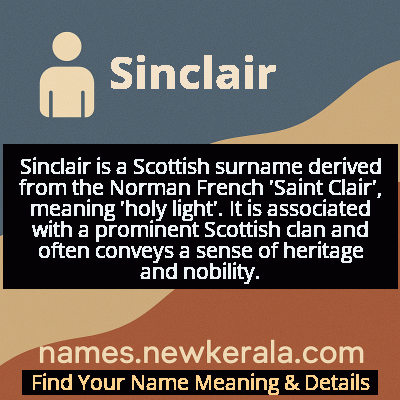Sinclair Name Meaning & Details
Origin, Popularity, Numerology Analysis & Name Meaning of Sinclair
Discover the origin, meaning, and cultural significance of the name SINCLAIR. Delve into its historical roots and explore the lasting impact it has had on communities and traditions.
Name
Sinclair
Gender
Male
Origin
Scottish
Lucky Number
4
Meaning of the Name - Sinclair
Sinclair is a Scottish surname derived from the Norman French 'Saint Clair', meaning 'holy light'. It is associated with a prominent Scottish clan and often conveys a sense of heritage and nobility.
Sinclair - Complete Numerology Analysis
Your Numerology Number
Based on Pythagorean Numerology System
Ruling Planet
Uranus (Rahu)
Positive Nature
Strong sense of order, loyal, practical, and disciplined.
Negative Traits
Stubborn, overly serious, rigid, and prone to feeling restricted.
Lucky Colours
Blue, gray.
Lucky Days
Saturday.
Lucky Stones
Blue sapphire.
Harmony Numbers
1, 7, 8.
Best Suited Professions
Managers, engineers, accountants, organizers.
What People Like About You
Dependability, discipline, practicality.
Famous People Named Sinclair
Sinclair Lewis
Novelist
First American Nobel Prize in Literature winner
Clive Sinclair
Inventor
ZX Spectrum computer pioneer
Upton Sinclair
Author and reformer
Pulitzer Prize winner, food safety activist
Gordon Sinclair
Broadcaster
Canadian media icon and commentator
Name Variations & International Equivalents
Click on blue names to explore their detailed meanings. Gray names with will be available soon.
Cultural & Historical Significance
Extended Personality Analysis
People bearing the Sinclair name are often characterized by their intellectual curiosity and strong moral compass, traits reflected in the name's historical bearers. They typically exhibit a blend of traditional values and innovative thinking, much like the Sinclair family's dual role as preservers of heritage and patrons of new ideas throughout history. Sinclairs tend to be natural leaders with excellent communication skills, whether expressed through literature like Sinclair Lewis, social reform like Upton Sinclair, or technological innovation like Clive Sinclair. They often display remarkable perseverance in pursuing their goals, combined with a practical approach to problem-solving. Many Sinclairs show a strong sense of social responsibility and ethical concern, likely influenced by the name's association with reform and progress. Their personality often includes a touch of rebelliousness or nonconformity, challenging established norms while maintaining respect for tradition and knowledge. This creates individuals who are both grounded and visionary, capable of bridging different perspectives and finding innovative solutions to complex problems.
Modern Usage & Popularity
In contemporary naming practices, Sinclair maintains its position as a distinguished choice that bridges Scottish heritage with modern sophistication. While not overwhelmingly popular, it enjoys consistent usage particularly in Scotland, England, and North America, often chosen by parents seeking names with historical depth and intellectual connotations. The name has benefited from the broader trend of using surnames as first names, and its association with innovation through figures like Clive Sinclair makes it appealing to tech-oriented families. Recent years have seen slight increases in usage, possibly influenced by growing interest in Scottish genealogy and the enduring popularity of Scottish names globally. Sinclair works well in professional contexts while retaining distinctive character, and its multiple nickname options (Sin, Clair, Clyde) provide flexibility. The name's gender-neutral potential, though still predominantly masculine, reflects evolving naming conventions. Its steady but selective usage suggests Sinclair will remain a classic yet distinctive choice rather than becoming overly trendy or common.
Symbolic & Spiritual Meanings
Symbolically, Sinclair embodies the powerful combination of enlightenment and heritage, drawing from its literal meaning of 'holy light' and its historical role in Scottish culture. The name represents intellectual illumination and spiritual seeking, reflected in both the Sinclair family's patronage of learning and the esoteric symbolism of Rosslyn Chapel. It also symbolizes cultural bridge-building, referencing the family's historical position connecting Norman, Scottish, and Norse traditions. In modern contexts, Sinclair has acquired additional symbolic meaning through its association with technological progress and social reform, representing innovation with conscience. The name carries connotations of integrity and principled action, influenced by Upton Sinclair's muckraking journalism and social activism. It symbolizes the balance between respecting tradition and embracing change, making it particularly relevant in our rapidly evolving world. For many, Sinclair represents the ideal of using knowledge and heritage as foundations for positive transformation and progress.

